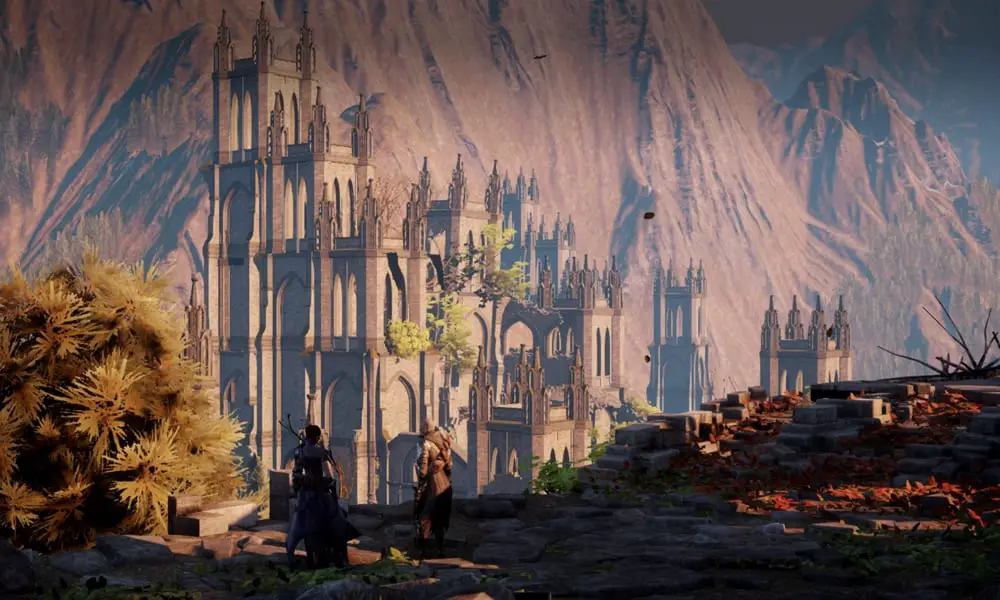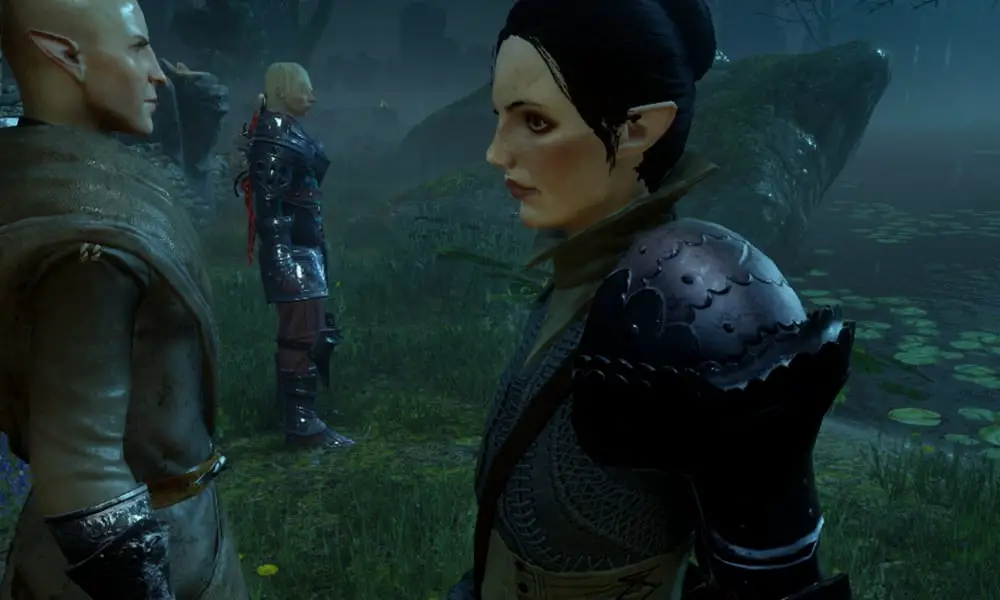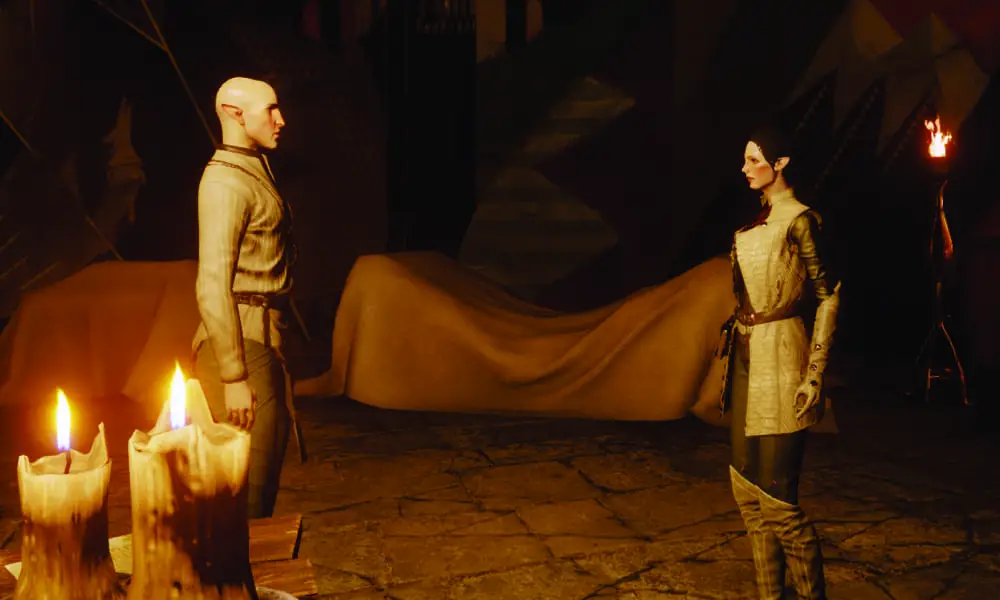In Dragon Age: Inquisition, the character of Solas often speaks in a poetic manner, but closer analysis reveals that this is, in fact, literally true, as in his most profound moments he is actually speaking to the cadences of one of the most beautiful songs ever written.
Spoiler Warning for all of Dragon Age: Inquisition.
He comes to me as though the Fade
were just another wooded path…
One of my favorite things about Dragon Age: Inquisition (and, specifically, about Patrick Weekes’s handling of the character of Solas) is the amount of real poetry and nuance you’ll encounter in the game’s dialogue, especially in Solas’s conversations. As with so much of the game, there’s real complexity and literary skill to be found. Solas’s elegant conversations and banters reveal a depth and empathy that greatly enrich the character who must eventually reveal himself to be our true antagonist, breaking our poor Lavellan’s heart (if she romanced him) all over again.
[Please excuse me as I take a slight break for sobbing, despair, cookies, wine, Solavellan YouTube videos, and adorable memes about Chauncey (the Tiny Polar Bear from The Black Emporium). Thus fortified, I’m back.]

Revelations in the Rhythms
As one of the most complex characters in the game, Solas is a bit of a paradox.
He appears to be a precise, rather guarded, and cold person at first glance. Yet it quickly becomes apparent that he’s a deeply passionate and feeling person, and that he’s much more fiery and emotional than he first appeared to be. This is why I’m always telling gamer friends to romance Solas in the game at least once—it’s not only the romance most directly tied to the main storyline (and it’s practically operatic by the time you reach “Trespasser”—I’d comment more, but I just stopped crying for the fourth time, so I’ll skip over it), but it’s also the best way to really experience how subtle and rich Solas is as a character, not to mention how playful and beautifully crafted his dialogue can be.
For instance, Solas often speaks iambically (with an unstressed syllable followed by a stressed one—essentially, a heartbeat rhythm). Iambic pentameter, most famously found in Shakespeare‘s works, meanwhile, is a string of five iambs (feet) specifically. The best way to remember or recognize iambic pentameter is that it’s basically five heartbeats (ba DUM, ba DUM, ba DUM, ba DUM, ba DUM). An easy way for me to remember it is always Shakespeare’s “But soft, what light through yonder window breaks?” Written iambically, it can be seen as: “But SOFT what LIGHT through YON-der WIN-dow BREAKS.”
Solas’s Subtle Iambs
A good example of Solas delving into iambic pentameter, for example, in “Trespasser,” is when Solas says to a romanced Inquisitor, “I want you to know that what we had was real.” Or, iambically, “I WANT (you to) KNOW that WHAT we HAD was REAL.” Once I stopped crying, I was able to appreciate the underlying subtle poetry of the statement. Barely.
But as Corseque points out here, Solas’s dialogue actually extends beyond iambic pentameter and instead reflects something I would argue is ultimately more difficult and complex—the rhythms of the classic Leonard Cohen song “Hallelujah.” It’s a slightly more irregular rhythm, yet it’s immediately recognizable once you hear it.
When Solas does this, it’s both poetic and lovely that he is almost always talking about the Fade, the dream-world and source of all magic that he loves beyond anything else. His speech in these moments is iambic, but it also moves in the song’s specific series of rhythms and patterns. Once you recognize them, you may find yourself singing along with his dialogue. I certainly did, and I found it weirdly delightful to do, especially since Gareth David-Lloyd’s voice performance as Solas—complete with subtle Welsh accent—is beautiful enough that it’s already only one step away from being actual music anyway.

From Cohen to Weekes: Inspirations and Patterns
The origin of the song’s effect on Weekes was discussed in a fascinating and revealing blog post by Bioware a few years back about which songs the writers and editors listened to while working on the characters. It’s a great article, and the playlist revelations by all of the writers and editors are delightfully true for each of their characters (for instance, yes, I do believe after reading about writer Lukas Kristjanson’s playlist, that Sera would totally listen to The Fratellis).
In that same post, Patrick Weekes revealed that in addition to listening to a number of movie soundtracks (as a fantasy writer and film-music nerd who writes to them frequently, I highly approve) and lots of Sarah McLachlan songs, that he had also listened to “Hallelujah” heavily while writing certain passages for Solas. Weekes chose the kd lang version, which is lovely, although for me nothing will ever quite touch the raw, stripped-down Jeff Buckley acoustic. The key element here is that Weekes was in fact so affected by the song that he then began to intentionally incorporate its distinctive patterns into Solas’s dialogue.
And this is where it gets brilliant. I love this—the way the subtext becomes text—plus, as a writer, I also enjoy the fact that it’s such a creative way to go with the flow when writing—to actually let something pull you along and into another world. It’s an appropriate song choice, given Solas’s true identity, as well as his bitterness, pain, isolation, and regret. It also adds another layer of yearning and regretful subtext if applied to a romanced Inquisitor.
But that was just the beginning. I loved discovering as I listened to the game’s dialogues and banters that Solas so frequently speaks in this poetic and rhythmic cadence, and (best of all), that he actually gives approval if the Inquisitor responds in the same way. And the Inquisitor’s not the only one (more on the other appearances of this speech pattern farther down).
Charting Cohen’s Cadences
As noted on Tumblr originally by Corseque and Veeeahknee, among others, the cadence and rhythm of the syllables of the song “Hallelujah” can be parsed numerically line by line as “8 / 8 / 11 / 8 / 8 / 11 / 8 / 9,” or, iambically, as “4 / 4 / 4 amphibrach 4 / 4 / 4 amphibrach.”
Or in another representation, Zeitheist also notes it more precisely as the pattern below:
iamb iamb iamb iamb
iamb iamb iamb iamb
iamb iamb iamb iamb amphibrach
iamb iamb iamb iamb
iamb iamb iamb iamb
iamb iamb iamb iamb amphibrach
You already know what an iamb is, the unstressed/stressed “foot” or single heartbeat. Meanwhile, an amphibrach is typically a stressed or long syllable between two unstressed or shorter syllables. So the amphibraches account for those three extra syllables that close every 12 iambs.
Thus, going back to Leonard Cohen’s original lyrics, the cadence of “Hallelujah” in its immediate opening verses reflects this pattern perfectly:
Well I heard there was a secret chord
That David played and it pleased the Lord
But you don’t really care for music, do ya?
Well it goes like this: the fourth, the fifth
The minor fall and the major lift
The baffled king composing Hallelujah
Hallelujah
Hallelujah
Hallelujah
Hallelujah
Now apply this to some of Solas’s most notable dialogue! (Note: In my examples, directly below and throughout, I’ve attempted to present the dialogue precisely according to the song’s required cadences, so that in some cases I’ve divided/hyphenated words, etc., to show how the dialogue hews to the song’s rhythms):
I’ve journeyed deep into the Fade
In ancient ruins and battlefields
To see the dreams of lost civilizations
I’ve watched as hosts of spirits clash
To re-enact the bloody past
In ancient wars both famous and forgotten
Every great war
Has its heroes
I’m just curious
What kind you’ll be
More “Hallelujah” Pattern Appearances
I went through as much DAI dialogue and banter as I could, and some additional samples of Solas’s “Hallelujah” dialogues include the following gems (many thanks to LadyIolanthe, by the way, who alerted me to a few of these that I had originally missed):
The Qunari Baker
I saw a young Qunari work-
ing in a simple kitchen, bak-
ing bread as she was ordered every morning.
In every loaf she broke the rules.
She’d take a pinch of sugar and
would fold it to the center, like a secret.
And this act of
small rebellion
brought a shining
smile across her face.
The Shadow Goddess
The Alamarri crossed the Frost-
back Mountains to escape a beast
they called the Shadow Goddess in their stories.
I met the spirit that they fled.
She walks the Fade along the south-
ern tundra, weeping, lonely, and forgotten.
Great Ferelden
formed because a
lonely spirit
drove her prey away.
The Korcari Wilds
I found in the Korcari Wilds
a humble cottage far removed
from any of the simple Chasind tribesmen.
The trees and weeds had not reclaimed
the home nor did the Chasind dare
to come and steal the trinkets still remaining.
It was empty,
long abandoned,
but the world feared
that she might return.
The Ancient King
I found an ancient spirit who
had once been undisputed king
of almost every land I had discovered.
Like pride or rage, it was the Fade’s
reflection of a feeling. When
I asked which one it was, the spirit faltered.
“They’ve forgotten,”
said the spirit.
“There remains no
word for what I was.”
The Forgotten Thaig
I found an ancient dwarven thaig
no longer sheltered by the stone.
An earthquake had exposed it all to daylight.
A thousand dwarven corpses lay,
the victims of a darkspawn horde,
their last stand marked by one great ring of armor.
In the middle,
one small body,
clutching tightly
to a small stuffed toy.
The Emerging Dwarf
I saw a dwarf emerge into
the light of day and shield his eyes
against the sun, the first time he had seen it.
The tears were streaming from his eyes.
I thought them from the blazing light
until I saw the rock he held so tightly.
Then he laid the
rock down gently,
and he left it
as he walked away.
In the Fade with Solas (Haven)
I told myself: one more attempt
to seal the rifts. I tried and failed.
No ordinary magic would affect them.
I watched the rifts expand and grow,
resigned myself to flee, and then…
It seems you hold the key to our salvation.
You had sealed it
with a gesture…
and right then, I
felt the whole world change.
Barindur
I found the ruin of Barindur,
a lost Tevinter city bur-
ied deep beneath a dead and barren wasteland.
Volcanic ash had sealed it tight.
In one dark moment, every liv-
ing creature in the city seared and smothered.
They were statues
in the ashes,
like a mold made
to recall the lost.
The Matchmaker
I met a friendly spirit who
observed the dreams of village girls
as love first blossomed in their adolescence.
With subtlety, she steered them all
to village boys with gentle hearts
who would return their love with gentle kindness.
The Matchmaker,
so I called her.
That small village
never knew its luck.
The Savage Human Horde
I saw a savage human horde
go marching toward the battlefront.
They sang a soldier’s hymn to keep formation.
The primal music shook the ground.
These savage unwashed warriors car-
ried harmonies no Chantry choir has mastered.
Though their cause was
all but hopeless,
they sang songs that
made the spirits weep.

Sing Along with Solas: Outside Responses in Cadence
Where it gets truly interesting is that Solas isn’t the only one “singing” to “Hallelujah.” Others will respond in kind when moved to reflect his spirit or mood. Cole, for instance, speaks in the “Hallelujah” cadence too, when Solas, grieving over the loss of his friend, a spirit of Wisdom, specifically asks him to remember her as he himself would.
Solas: (Sighing) Could you… if you would remember her, could you do it as I would?
Cole responds:
He comes to me as though the Fade
were just another wooded path
to walk without a care in search of wisdom.
We share the ancient mysteries,
the feelings lost, forgotten dreams,
unseen for ages, now beheld in wonder.
In his own way,
he knew wisdom,
as no man or
spirit had before.
Solas (moved) thanks him quietly, and is silent.
A Song of Forgetting
Cole does this again post-game, after you complete Dragon Age: Inquisition in its entirety. After you finish the main game (and get knocked over by the big reveal in the epilogue—a moment that must surely be one of the greatest incentives to IMMEDIATELY replay a game in gaming history)—if you go back and speak to all of your companions again, they will each have something to say about the battle or its aftermath. If you talk to Cole, meanwhile, in his perch at The Herald’s Rest, he will unknowingly repeat Solas’s devastating final words to him in that same familiar cadence:
“I’m sorry, Cole, but with your gift,
I fear that you might see the path
I now must walk in solitude forever.
This fate is mine alone. Indeed,
I would not wish it on an e-
nemy, much less someone that I once cared for.
“Though you reach out
in compassion,
I must now insist
that you forget.”
As Cole is probably the one companion Solas is closest to in the story (aside from a romanced or high-approval Inquisitor), and it’s appropriate and terribly sad that Cole would serve as a conduit for Solas’s words. These instances are all the richer because Weekes, as the writer for both Solas and Cole (as well as for The Iron Bull), was able to weave the patterns into their dialogues in a seamless way.
An Impromptu Duet
Cole is not alone. The Inquisitor also mimics the “Hallelujah” cadence on occasion when in agreement with Solas, and I think it’s a poetic and subtle way to represent sympathy between the two, as if the Inquisitor is in fact unconsciously singing the song along with him:
Solas:
The Chantry (alt: “Your Circle”) says that demons hate
the natural world and seek to bring
their chaos and destruction to the living
But such simplistic labels mis-
construe their motivations and,
in so doing, do all a great disservice.
Spirits wish to
join the living,
and a demon is
that wish gone wrong.
The Inquisitor responds:
Is there a way to coexist?
To live with them, if not in peace,
at least without such active confrontation?
Solas:
Not in the world we know today.
The Veil creates a barrier
that makes true understanding most unlikely.
But the question
is a good one
and it matters
that you thought to ask.
The Secret Chord in “Trespasser”
Meanwhile, Solas isn’t done singing. He notably repeats the pattern again several times in the emotional final conversation in the Dragon Age DLC “Trespasser:”
I sought to set my people free
from slavery to would-be gods
I broke the chains of all who wished to join me.
The false gods called me Fen’Harel,
and when they finally went too far
I formed the Veil and banished them forever
Thus I freed the
elven people
and in so doing
destroyed their world.
And again:
I lay in dark and dreaming sleep
while countless wars and ages passed
I woke still weak a year before I joined you.
My people fell for what I did
to strike the Evanuris down
but still some hope remains for restoration.
I will save the
elven people.
Even if it
means this world must die.
The Dread Wolf’s Heart
To complete the pattern’s meaning and subtext, it even appears on a romanced Lavellan‘s final panels as “Trespasser” ends and we discover the fates of our friends:
Lavellan sometimes came awake
from dreams in which her lover watched
her sadly from across an endless distance.
If they were more than simple dreams,
she could not say, for every time
she reached for him, he vanished into nothing.
Still she searched, and
dreamed, and waited
for a way to
change the Dread Wolf’s heart
So are you singing the song yet? I’ve been singing it while writing this entire post (in between weeping bouts). Meanwhile, have I missed any other appearances of the pattern? Please do share your thoughts in the comments!
Images courtesy of Bioware
This article is a reprint (with minor modification) of an article originally published by Angela D. Mitchell on DumpedDrunkandDalish.com.

